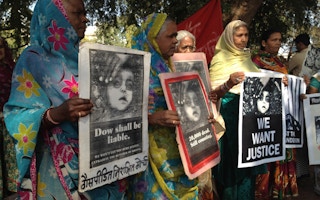The film ‘Bhopal: A Prayer for Rain’ premiered in Singapore recently and brought to life for audiences the horrific scenes from the disaster of 2 December 1984, when 25,000 people died in the aftermath of a runaway reaction at a pesticide factory in the Indian city of Bhopal.
To continue reading, subscribe to Eco‑Business.
There's something for everyone. We offer a range of subscription plans.
- Access our stories and receive our Insights Weekly newsletter with the free EB Member plan.
- Unlock unlimited access to our content and archive with EB Circle.
- Publish your content with EB Premium.
Based on the well-known Bhopal gas tragedy, the film shows how a series of appallingly irresponsible decisions taken by Union Carbide, the American multinational behind the plant, inevitably led to the release of 27 tonnes of the deadly gas methylisocyanate (MIC) over the city.
These included disabling safety sirens to prevent panic among the community, lying to worried workers that MIC was safe, having untrained workers man dangerous equipment, and switching off the refrigeration required to store the volatile poison safely, among many others.
The state government of Madhya Pradesh (of which Bhopal is the capital) also turned a blind eye to Union Carbide’s missteps, so as not to lose much-needed jobs in the local community.
The film’s title alludes to the drought that underpinned the disaster. An arid season and poor yields caused farmers to purchase less pesticides; Union Carbide’s actions were a desperate bid to protect already fragile profit margins. The resulting disaster caused tens of thousands of needless deaths and left more than a hundred thousand survivors and their families suffering debilitating health problems even today.
I’d like to believe that such brazen oversights by companies and governments in the name of profit have been scrubbed from the corporate landscape today. But this is sadly not the case, and the need for stronger government and corporate accountability has never been more urgent.
Dharmesh Shah, an activist for the International Campaign for Justice in Bhopal, told the audience after the screening organised by telecommunications giant Starhub earlier this month: “We may not have seen any major disasters like Bhopal since 1984, but a similar lack of corporate accountability and transparency is rampant even today.”
Indeed, even though the mantra “profit, planet, and people” has risen in popularity in the global business language, evidence suggests that it is far from being a universal reality.
The safety oversights leading to the 2011 Fukushima nuclear disaster, oil giant BP’s 2010 spill in the Gulf of Mexico, reports of China’s ‘cancer villages’ are a few examples of companies pursuing profit with inadequate attention to social and environmental concerns.
As recently as Friday, energy giant Shell announced that it will resume drilling in the ecologically fragile Arctic region, a “massive risk” according to environmental group Greenpeace.
The hallowed triple bottom line will not be achieved unless governments and companies undergo a major shift in how they define success.
Furthermore, government-imposed regulation on labour laws, safety standards or land concessions can set the right tone for responsible and safe practices by businesses.
“
What’s encouraging is that digital technology and social media are dragging companies into an era of transparency, whether they like it or not. While this spells trouble for companies who have something to hide, it could also be an opportunity for others to showcase their responsible practices on a global stage.
This was successfully achieved, for example, in the 1987 Montreal Protocol, when every United Nations member state agreed to phase out the use of Ozone-depleting chlorofluorocarbons, a move that has helped restore the Earth’s protective layer today.
However, this feat of international cooperation has not been successfully replicated in many other global issues requiring the same attention.
Companies who adhere to stringent laws in their home countries can sometimes exploit weak laws in other territories. This was evident in the numerous safety and labour violations that surfaced in the aftermath of the collapse of the Rana Plaza garment factory in Bangladesh – where workers made garments for European brands such as Primark and H&M.
More global, or at least regional, cooperation is needed to set and enforce universal rules that govern corporate behaviour in areas such as safety, wages, and pollution, to avoid safe havens for companies to cut corners on their environmental and social responsibilities.
Greater transparency and accountability from companies
The final scenes of Bhopal: A Prayer for Rain are hard to erase from memory. In the closing slides of the film, it tells us that some 10,000 bodies were counted in the first 72 hours after the disaster. Bodies were littered across roads, train tracks, in lakes and dilapidated hospitals. The sense of outrage is only compounded by the events that followed.
Union Carbide never apologised for the disaster. Instead, a lengthy legal battle ensued. The company maintained the disaster was due to sabotage. The lawsuit eventually resulted in a paltry $470 million in compensation - a mere “$2,000 per corpse”, according to filmmakers.
Warren Anderson, the company’s chief executive, was charged with manslaughter by the Indian government, but never brought to justice. He died at a nursing home in Florida, aged ninety, last year.
Even today, there is inadequate censure for profitable projects that violate environmental or social concerns.
A high-profile example has been the preparations for the 2022 World Cup in Qatar, which continue even as one Nepali worker dies every other day due to harsh working conditions and abuse, according to the Guardian.
In theory, it is easy to identify exactly what companies should do to ensure that they operate safely and responsibility. But a lack of visibility into the inner workings of some companies makes enforcement difficult.
What’s encouraging is that digital technology and social media are dragging companies into an era of transparency, whether they like it or not. While this spells trouble for companies who have something to hide, it could also be an opportunity for others to showcase their responsible practices on a global stage.
Promising signs
There are heartening signs that companies and governments are moving in the right direction, however.
Last year, for example, the Singapore stock exchange announced plans to make sustainability reporting mandatory for all listed companies.
Further afield, tech giant Apple banned the use of toxic chemicals benzene and n-hexane in the final assembly of its devices, even as the company’s chief executive Tim Cook informed an investor at a shareholder meeting that he didn’t consider the “bloody ROI (return on investment)” when initiating environmental protection programmes.
More companies are also linking executive bonuses to how well they deliver on environmental targets, as a recent global corporate sustainability ranking by Canadian advisory firm Corporate Knights found.
We need to see more of these trends in 2015, a year that many believe will be a turning point for the fate of the planet.
The Sustainable Development Goals that the global community will adopt in September and a global climate change deal in Paris will greatly enhance our efforts in reducing poverty, fighting climate change, and sustaining a prosperous global economy.
Fatal disasters like the Bhopal tragedy should remain consigned to history and the unethical, self-serving motivations that cause them have absolutely no place in today’s world.











